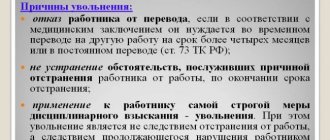From the article you will learn:
If a serviceman becomes ill, he may be discharged from the army. In circumstances where a serviceman is dismissed for health reasons, it is necessary to consider in detail how the dismissal procedure takes place, what the dismissed person is entitled to and what the legislation says about this.
The list of diseases that prevent further service is very extensive. These include diseases of the nervous system and mental disorders, neoplasms and visual impairment, infections and excess weight.
All these diseases have one determining factor: the disease entails a risk to the life of a serviceman and makes it impossible to further perform his duties without harm to health.
In more detail, this type of disease includes:
- HIV, syphilis, tuberculosis, mycoses and other genitourinary diseases;
- neoplasms – malignant and benign;
- blood diseases and circulatory disorders – anemia, hemophilia;
- diabetes and obesity;
- respiratory diseases;
- infectious diseases;
- digestive diseases and metabolic disorders in the body;
- visual impairment – strabismus, glaucoma, blindness;
- hearing diseases;
- personality disorders;
- encephalitis, meningitis, paralysis, Parkinson's disease;
- period of pregnancy, childbirth and the postpartum period;
- exposure to external factors leading to poisoning, injury, etc.
Please note that if the disease has worsened due to alcoholism or drug addiction, military benefits are not retained by the serviceman upon dismissal.
Such diseases must be documented by doctors. The diagnosis occurs at the stage of undergoing a medical examination, then the serviceman is sent to undergo the military military examination and receives a category.
The Regulations on Military Medical Examination (MME), which was approved by Government Decree No. 565, provides an exhaustive list of diseases.
A commission based on health conditions can be based on the results of the fitness category obtained. Thus, category B means limited suitability for military service under a contract, starting from conscripts and ending with those who have the rank of sergeant major, and category D means unsuitability for military service.
The legislation also defines other categories of suitability, where:
- A - means suitability for military service in any army;
- B – certain conditions are required for service;
- D – performance of duties is not allowed for a certain period of time.
A serviceman with category A cannot retire early for health reasons.
Drawing up a report
This document is of utmost importance in a situation where a serviceman leaves military service. That is why the report must be drawn up legally correctly. You should report your dismissal to your immediate superior in any form. This can be done after the military personnel have passed the Military Military Commission and received a category. In order to correctly draw up a report, it should indicate:
- data of the retiring and HF commander;
- the grounds that served as the reason for dismissal, namely the conclusion of the IHC indicating a specific disease or existing injury;
- data on family composition;
- living conditions – availability of residential premises for living;
- information about the family’s place of residence at the current time;
- consent or disagreement to dismissal before provision;
- date of the report and personal signature.
You can download a report on the dismissal of a serviceman for health reasons on our website below.
Download a sample report on dismissal from the RF Armed Forces for health reasons
In addition to the report, you must attach a medical report with a diagnosis and a copy of the rental agreement for office housing.
If a contract is terminated early, the unit commander must have a conversation with the person being dismissed. What information must the official provide:
- information about the timing of dismissal;
- provided benefits in the event that a serviceman goes into the reserve or retires;
- information about the department of the military registration and enlistment office in which the reservist will be registered;
- request from the dismissed person information about the actual place of residence after dismissal;
- find out the presence or absence of additional requests from the serviceman.
The conversation must be documented on a special sheet. This document is attached to the serviceman’s personal file.
Download the form for a conversation with a discharged serviceman
Main types of VVC
The military medical commission is given a large number of responsibilities. In order for them to be carried out more quickly and efficiently, IVCs are divided into categories. Each of them has specific goals and objectives.
A staff unit is created on the basis of a specific military unit that requires constant consultation from various medical specialists. This organization has the right:
- Issue conclusions based on the Regulations on military medical examination.
- Monitor, approve or challenge the conclusions of lower-level IHCs, and, based on newly discovered circumstances, review their own decisions, as well as the conclusions of equivalent commissions (when changing the place of residence of persons subject to examination).
- Check the work of lower-level military commanders and give them instructions regarding issues of military medical examination.
- Receive information from medical and military medical organizations, military units, educational institutions and military training facilities that supplement reports on the results of examinations of citizens.
- Involve medical specialists at various levels to resolve issues related to medical expertise.
- Send employees, military personnel and members of their families for control examination, re-examination or for inpatient or outpatient treatment to the appropriate medical units.
Medical staffing commissions have an official seal and a corner stamp. They are used to certify documents issued by members of the IHC.
Another type of IHC - non-staff - does not have such broad powers, since it is formed on the basis of various medical institutions. Non-staff commissions are divided into permanent and temporary. The first type includes the Military Military Command of the Medical Unit, the Ministry of Internal Affairs, the Central Internal Affairs Directorate, the Internal Affairs Directorate for a constituent entity of the Russian Federation, the Military Military Command of the General Military Command of the Internal Troops and others.
The second category includes commissions based on educational institutions, military educational institutions and others. Non-staff organizations do not have their own seals. To certify their conclusions, they use the seals of the institutions to which they are attached.
A hospital IHC can be formed on the basis of a hospital, clinic, sanatorium or hospital. Its purpose is to examine military personnel undergoing examination or treatment in these institutions.
Payments and compensation upon dismissal
Upon dismissal for health reasons, military personnel are entitled to a one-time payment, which includes:
- one-time benefit;
- compensation for loss of health.
Work experience is the determining factor in calculating the lump sum benefit. If a serviceman has served for 20 years or more, then the payment amount will be from 7 to 15 salaries, in other cases, when the length of service is less than the specified period, the dismissed person will be paid from 2 to 5 salaries.
Important! If a citizen was dismissed without pension accruals, then he will continue to receive his salary throughout the calendar year.
In addition, upon retirement, a serviceman is entitled to:
- payment of salary for the last month of service;
- compensation for property;
- bonus payment;
- compensation for unused vacation days.
If a serviceman has alimony obligations, their transfer will be made from the full amount of money paid upon dismissal.
Other reasons for dismissal
Military personnel serving under contract, unlike conscripts, have the right to retire not only for medical reasons.
A contractor may terminate his service due to the expiration of the contract, due to reaching the maximum age for service or due to length of service. The official reason for dismissal is the reduction of the position held by the serviceman or the decision of the commission that he cannot occupy it in the future. If a citizen violates the rules of the contract or commits a serious offense, he also faces dismissal.
In case of early termination of contract service, the family circumstances of the citizen are also taken into account. If close relatives (children, parents) need constant care or are unable to live at their place of service, the serviceman is discharged from the army.
The most compelling reason for early dismissal (other than medical) is considered to be deprivation of military rank and imprisonment as a punishment for a crime.
In these cases, a medical examination before leaving service is voluntary. The citizen decides independently whether to undergo examination or not and reflects his decision in the dismissal report.
Who is entitled to a pension?
The size of the pension will depend on the disability group that was assigned to the military personnel with a certain type of disease:
- for 1 group its size is 14 thousand rubles;
- for group 2 – 7 thousand rubles;
- for group 3 – 2 thousand rubles.
The size of the pension payment is affected by the presence of an increased regional coefficient. Then the pension amount will differ significantly.
If the serviceman has not been assigned a disability group, then the monthly payment will be established upon reaching a certain age or with a minimum total length of service.
The law includes the following necessary conditions:
- reaching 45 years of age and 20 years of total military service;
- reaching 45 years of age and 25 years of total work experience (in this case, the minimum length of military service must be 12 years 6 months).
If an officer has served less than 10 years, he has the right to apply for preferential terms for a mortgage.
List of diseases
When making a decision to dismiss a military personnel for health reasons, the list of diseases according to the International Classification of Diseases (ICD) includes:
- Diseases of the heart and blood vessels (pressure changes).
- Diseases of the nervous system that cause dysfunction of the limbs.
- Problems of the musculoskeletal system that limit movement.
- Acute inflammation of the lower respiratory organs.
- Psychosomatic disorders (including mental disorders).
- Detected tuberculosis.
- Skin diseases.
- HIV infection.
- Venereal diseases.
The military legislation of the Russian Federation stipulates that medical examinations of soldiers and officers are carried out by special military medical commissions.
Based on the results of the examination, the commission issues a conclusion, on the basis of which monetary compensation is paid upon dismissal.
What diseases serve as grounds for termination of service?
According to the above Resolution No. 565, each type of disease corresponds to a certain fitness category. We list possible diagnoses that impede service in the table.
| Name of the disease | Suitability category |
| Incurable infectious diseases | IN |
| Functional disorders of a temporary nature due to infectious diseases | G |
| Tuberculosis | V, D |
| Leprosy | D |
| HIV infection | D |
| Syphilis | D, V, G |
| Malignant and benign tumors | D, V, G |
| Blood diseases | D, V, G |
| Diseases of the endocrine system (depending on severity) | B-D |
| Mental illness (depending on severity) | B-D |
| Epilepsy | B-D |
| Brain diseases | V, D |
The above list reflects only part of the possible deviations in health status; in this document it is much broader.
Impaired health is not always accompanied by complete exclusion from military service. In some cases, when group B is assigned, it may be temporary for a period of treatment followed by resumption of service in the army.
Conditions allowing for dismissal due to deterioration of a serviceman's health:
- Symptoms of the disease appear regularly;
- A medical specialist identifies a significant disorder of body functions;
- The presence of chronic diseases requiring regular treatment;
- A serviceman has been on sick leave for more than 4 months in a row.
A citizen serving in the army has the right to retire from the armed forces due to illness, provided that he is found to be of limited fitness, but is not required to do so.
Determination of the degree of suitability
All persons (conscripts, contract soldiers, professional military personnel) undergo a medical examination before entering military service. A commission consisting of specialists from various fields assigns a degree of suitability to each candidate.
The following categories of suitability are legally established:
- A – it is possible to serve in troops of any kind;
- B – military service is possible under certain conditions;
- B – limited suitability;
- D – military duties are temporarily unavailable;
- D – further service in the armed forces of the Russian Federation is not allowed.
Candidates for officer positions are subject to increased mental health requirements.
The assignment of categories is influenced by illness and injury. Having category A, a serviceman does not have the right to retire early for health reasons. Dismissal of a serviceman for health reasons (category D) means unconditional dismissal from the army.
List of diseases
For all military citizens, the procedure for dismissal from military service has a clear mechanism regulated by the current legislation of the Russian Federation. First, you should study some important points regarding the issues of dismissal of military personnel.
This makes it possible to avoid misunderstandings in the future. It should be noted that in order to be dismissed due to deteriorating health, all persons serving in the army must draw up a corresponding report and submit it to their commander.
According to the Federal Law, military personnel are dismissed from service in the following cases:
- if the citizen has reached the age limit for holding his previous position;
- if the term of service under a contract or conscription has expired;
- The soldier has serious health problems. However, in such a situation, only a military medical commission can recognize its unsuitability;
- Dismissal is possible based on the testimony of members of the military medical commission. In this case, persons who serve in the army under a contract are exempt from their positions;
- a person may lose his job if he was deprived of his military rank;
- dismissal from office by a court verdict in connection with the sentencing of a citizen to imprisonment for a certain number of years.
Terminating a contract with a subordinate due to unsatisfactory health requires knowledge of some important features. Moreover, all compensation payments are returned to the employee only if certain conditions are met.
Raising the issue of transfer or deprivation of a particular citizen of a position is carried out only in case of serious illnesses, acute or chronic. Many people serving in the army are interested in what is the list of diseases for dismissal from military service under a contract?
The list of ailments is as follows:
- any serious disease of the nervous system, which has had a tremendous impact on the functioning of the upper and lower extremities. Pathologies of this nature cause damage to health, which is why there are disruptions in the functionality of the human musculoskeletal system;
- diseases of the heart and blood vessels. This includes blood pressure disorders;
- psoriasis can also lead to discharge from the army.
Infectious diseases:
- mycoses - a disease that is provoked by infection with parasitic fungi;
- tuberculosis is a serious damage to the respiratory system, which can later spread to other important components of the human body;
- syphilis is a chronic disease that is transmitted sexually (the consequences of the disease can be very dire);
- HIV (human immunodeficiency virus) is a serious illness that is accompanied by slow damage to the immune system and subsequently leads to the patient’s body being unable to protect itself from any dangerous pathologies;
- leprosy is a chronic disease that gradually affects and destroys the skin, after which it spreads to the nervous system.
Expert opinion
Kuzmin Maxim Petrovich
Lawyer with 8 years of experience. Specializes in criminal law. Recognized legal expert.
Diseases of the musculoskeletal system: disc herniation (intervertebral hernia) and other diseases that significantly limit the performance of official duties of a military personnel.
Pathologies of the endocrine system and ailments caused by poor nutrition and other important metabolic disorders:
- obesity;
- diabetes mellitus is a disease that leads to insulin deficiency in the human body;
- Gout is a disease in which urate crystals accumulate, leading to serious metabolic problems.
Neoplasms:
- malignant tumors that gradually affect other important human organs and systems (melanoma);
- Benign cancers that do not interfere with the normal functioning of other organs.
Pathologies that negatively affect the functioning of the circulatory system are as follows:
- leukopenia is a disease that reduces the production of blood cells;
- all types of anemia - this disease significantly reduces the concentration of hemoglobin in the circulatory system;
- hemophilia is a disease in which there is a significant minimization of the production of blood cells that promote blood clotting;
- blood pathologies of various kinds , which cause enormous harm to the human immune system.
Diseases of the respiratory system (bullous pulmonary disease). Ailments that are associated with a significant deterioration in eye functionality. This includes strabismus, complete blindness, glaucoma, myopia and farsightedness.
Legislative basis
Legal regulation in the field of military service is carried out through the following regulations:
- Federal Law “On Military Duty and Military Service” (reflects the procedure for admission, passage and discharge from the army).
- Federal Law “On the Status of Military Personnel” (establishes the rights to use social benefits and the amount of a one-time benefit).
- Federal Law “On monetary allowances for military personnel and provision of individual payments to them” (determines payments to those resigning due to illness).
- Decrees of the President of the Russian Federation (on the right to receive housing certificates, on the choice of grounds for termination of a contract by the military).
If a serviceman dies as a result of injuries received or due to deterioration of health caused by professional activity, the state guarantees social benefits and pays benefits to his family.
How to resign for health reasons: procedure
The dismissal procedure is as follows:
- Initially, the serviceman must undergo a medical examination at his military unit. If he wants to leave the army of his own free will due to poor health, then he must obtain medical documentation. After the examination, the doctor will display the real state of the person’s health. This alone is the reason why a particular citizen can be dismissed from the RF Armed Forces;
- the next step is a conversation with the command. After the subject has received a doctor's note stating that his medical condition does not meet the needs of military status, he should contact management;
- then a report is drawn up. Based on this document, the citizen will be dismissed within the next thirty days;
- after this, the commander of the structural unit where a particular person is serving publishes an order to remove the authority from the person.
Procedure: how to resign from the army for a military man serving under a contract?
The commission procedure is based on Federal Law No. 53-FZ, Art. 51. Dismissal procedure:
- Examination in a military hospital to obtain a certificate from a military medical commission based on information about the course of the disease.
- Drawing up an appropriate protocol if further military service is impossible.
- Drawing up a report by the military personnel and submitting it to the commander of the military unit.
- Conducting a personal conversation between the commander and the serviceman.
- Issuance of an order from the commander of a military unit on termination of service.










